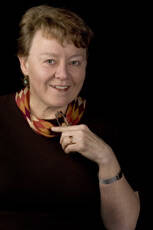I met Marian Anderson when I was a young teen and she was in her late 60s, and we spoke for a few sweet moments in her backstage dressing room. She had just finished performing at the Phoenix Union High School auditorium, one of many stops on her farewell tour, which began in Constitution Hall, from which she had once famously been barred, and ended in Carnegie Hall. After that tour, Anderson retired from singing.
Our brief encounter took place in the mid-1960s, during the struggle for civil rights that introduced my generation to the injustice of racial prejudice. I had not yet come of age politically, though I would soon. In the encounter with Ms. Anderson, I was childlike, unaware of the decades of discrimination this great singer had suffered, unaware that little white girls probably never came round after her every concerts to gush over her.
Ms. Anderson welcomed me warmly. I went over and hugged her neck. She took my hands in hers and held them as she asked me about myself. I recited what we had in common-facts I had just learned from the souvenir program: our fathers had both died, hers when she was 12, mine when I was an infant we were both Baptists who sang in our church choirs we were both altos who liked to sing spirituals. She sang "Twelve Gates Into the City” and "Ride on King Jesus” that night, as I recall, songs I have loved ever since. It is possible that my total lack of awareness of our differences struck Ms. Anderson as a sign of the changing times. I mentioned that this was the first professional concert I had ever attended. She autographed my program.
Truth is, before that week I, like most of the 70 students in our high school chorus, had never heard of the great Marian Anderson. Mr. Harris, our choir director and my favorite teacher, had told us about her, describing her voice and urging us to take advantage of this once-in-a-lifetime occasion. He must have told us that she was a "Negro” perhaps he even showed our class a film about her or played a recording. But I went to hear "the voice of the century,” as my teacher (citing Arturo Toscanini) called hers, and to learn what a contralto was, exactly.
Today I am grateful for having once seen, heard and met Marian Anderson. For in doing so, I experienced firsthand her legendary serenity, grace and personal dignity on stage and understood intuitively that her own profound faith shaped the way she sang religious songs and communicated their meaning. I noticed the range of her voice (four octaves) and of her skill as she sang songs of different genres and in several languages. At my first concert I heard a world-class singer perform classical music, which set the bar high for every other performance I would attend. And in our brief meeting, I felt her touch, saw how she listened and looked directly at me, smiling and joyous, and experienced her kindness in taking time with an unknown teen when she likely needed some quiet, peaceful moments to herself. That night I also sensed the difference between a celebrity (rich and famous) and a person of accomplishment, character and significance.
Sixteen years after Anderson's death and 70 years after her Easter concert on the steps of the Lincoln Memorial, that event is viewed as a turning point in changing racial attitudes in America. The singer once barred from Constitution Hall went on to sing there often she had a major role at the Metropolitan Opera in New York and was awarded honorary doctorates, the Presidential Medal of Freedom and a Grammy for lifetime achievement. As her voice rang out over the radio this Easter in songs from the historic concert aired on National Public Radio, I wondered how many in this generation she would touch with her voice and her dignity.








